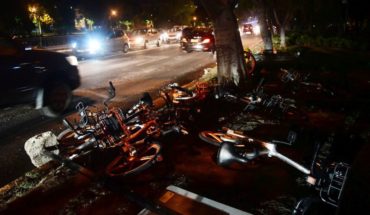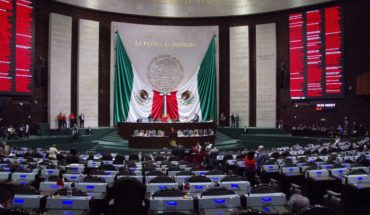
“We have close a plebiscite, which does not divide us between friends and enemies,” Pastor Emiliano Soto warned in the only clear reference to the plebiscite on 25 October in the evangelical Te Deum that took place yesterday and attended by the President, Sebastián Piñera, with other government authorities. The ceremony this time was held at the headquarters that the Church of missionary Christian Alliance has in Las Condes and, it was much more sober than in its versions of previous years in its traditional location of jotabeche street cathedral in Central Station. It had a tone and shape far from other occasions, such as that 2017 version in which the pastors’ lit preachings uncomfortably alluded to the then Mandataria, Michelle Bachelet.
Although Bishop Emiliano Soto’s speech – recognized as closer to the opposition – dodged contingent politics, the truth is that the dispute between the “Apruebo” and “Rejection” option with a view to The Constitutional Referendum of October, has already settled in the world of the Protestant faith. Not only that, the campaign has been fully deployed since last week.
“Keep in mind that you are the ones who can make a difference about this election, especially because of the moral values that you can convey to people who believe that this is being lost”, words of Monday, September 7 and that correspond to Fernando Serimedo, director of the Argentine pollster Numen, who last week published a survey of 18,000 people , in which on 25 October 53% of people would vote Rejection and 47% Approve.
Serimedo’s message was just what the more than 20 representatives from different organizations who came together by Zoom that day wanted to launch the “Evangelicals for Rejection” platform. On the occasion, dark omens were heard about what may happen if in October the option of “Apruebo” is imposed, such as that the process is “espurio and illegitimate and those who promote this change, are promoting violence and attacking freedom”, said the pastor, José Lema, of the Evangelical Union. In the same line, Belarmino Silva of the Evangelical Network of National Unity, warned that “freedom is in danger, we want to be kept this contract”.
All organizations, such as the Christian Conservative Party, the Christian Social Vanguard or the New Time Christian Party, which participated in the meeting, expressed an apocalyptic perspective on a new Constitution. Among the participants was repeated too many times the phrase “Reject to reform”, a line that coincidentally coincides with the public campaign that have deployed political forces such as the UDI and half of the RN leading the campaign for “Rejection”.
The village used
As has happened for a couple of years now, Renovación Nacional is the party on the right that has been concerned with strengthening political ties with the evangelical world and it is known that its deputies, Eduardo Durán Salinas, Francesca Muñoz and Leonidas Romero, are active representatives of the so-called “evangelical bench”. But now, that coordination has intensified and points to electoral work with a view to “Rejection” in the referendum.
Ms. Catalina del Real – part of the RN MPs for Rejection – participated in the pastor’s talk show, Hédito Espinoza, one of the most combative figures in the walloric crusade against laws such as civil union for same-sex couples or one that allows abortion on three grounds. “I am not evangelical, but as a Catholic we have found valric coincidences with the Evangelical Church, especially when there are people within our party who have expressed the following by the Apruebo,” said Ms Del Real.
However, one of the spokesmen of “Evangelicals for Rejection”, Daniel Rozas, the organization that was born from churches based in La Pintana, relations with political parties are cut off. “We are consenting that historically we have been used, but now we have no one to defend us. Lavín and Longueira want a new Constitution and from our point of view, Pablo Longueira and Camila Vallejo make no difference. The important thing beyond colors is to keep God at the center of society. Today it is precisely one of our goals to show the people that we have made a mistake in their relationship with politicians. We need our representatives,” Rozas stressed.
The spokesman for “Evangelicals for the Rechhe spoke of the widespread fear that prevails in evangelical hosts that a new Constitution will directly affect them. “There is enough evidence to argue that one of the elements you want to touch is the Cult Act. There are certain laws, such as the Zamudio Law or the Gag Bill (which seeks to sanction the denialism of the dictatorship), that seek to coerp a little freedom of conscience, freedom of expression. Precisely, our freedom of conscience, our freedom of worship is the manifestation of our belief. If you coern that freedom, which in practice translates into worship, we are not talking about a assumption, but concrete evidence”
Although in the grouping of “Evangelicals for Rejection” they claimed that they are independent and that they will host all organizations or parties that adhere to their values, it is easy to find matches with the Republican Party of José Antonio Kast. One of its vice-presidents, Maria Gatica, is evangelical and, according to Kast’s party, the approach to the evangelical world is “well before this electoral process.”
The academic, doctor of history and specialist in ecclesiastical issues, Marcial Sánchez, emphasized that José Antonio Kast is a key character in the political position expressed by the evangelicals who will vote for Rejection. “There are two characters that are key, one is Kast, who is telling them that there has to be Rejection, that they are going to lose religious freedom, so there are sectors that have approached Kast. The other, is the son of Pastor Durán, Eduardo Durán, works with a team that are true promoters of Rejection, because they are convinced that the Apruebo will cause them a discredit. One thing has nothing to do with the other. They are involved in a political game of lies and truths.”
Relationships cut off
In the political game, the Durán clan has been down since the patriarch, Eduardo Durán Castro, generated a strong controversy motivated by his luxurious lifestyle as leader of the Cathedral of Jotabeche and who definitely fell out of favor with his faithful, when it was found that he maintained an extramarital relationship. On 24 June, the Supreme Court settled a factional dispute over the control of the Cathedral – and indeed the bulging monthly tithing figure given by the faithful – confirming Durán’s dismissal.
Although your child is still linked to Chile Vamos, he no longer has the same arrival in La Moneda, particularly with the National Office of Religious Affairs (ONAR) that depends on the Segpres. The rupture is, in any case, according to a source of the organism, in both directions. Although Pastor Jorge Mendez, close to Durán, remains part of the instance, relations are at a lousy time.
“When Duran fell, relations with the government were greatly weakened, because the government was unchecked. In addition, President Piñera supported the laws they opposed, signed the Gender Identity Act. Afterwards, the Members of the evangelical bench tensioned the government by voting in favour of 10%. The government sanctioned and fired Patricio Moya, who was one of the 2017 Te Deum against Michelle Bachelet. Clearly there’s a break. Client relations were broken,” explained one member of ONAR, recalling that Moya complained publicly in a video of his disengagement in mid-July, directly targeting a vendetta by then-Minister Claudio Alvarado (UDI), for not having managed to align evangelical MPs against the project to withdraw 10% of the planned funds.
That is one thing and another is to say that client relations are over, because those practices are inherent in the governments of any coalition. Evangelicals, according to the last Census, are estimated at 3 million people, almost 20% of the population. This volume is divided into some 3,500 churches of different denominations, which in practice represent highly disciplined voters – in most cases. That’s why relationships with this world can’t be cut that easily and completely.
For example, in the Subdere in a key position in the face of the upcoming elections of regional and municipal authorities, eleonora Espinoza, militant RN and daughter of Pastor Hédito Espinoza, one of those who bears the banner in favor of Rejection and who has come to occupy the place in popularity that remained after the fall in disgrace of Durán Csstro.
Half-truth
Esteban Quiroz, lawyer and spokesman on the other side, Evangelicals by the Apruebo, does not believe that the gospel vow is as disciplined as thought, because in the churches there are many and each person votes in conscience.” There is a lot of caricature and that is part of the instrumentalization that has come since 1974, when the Council of Pastors was created to support the dictatorship, which gave them the visibility of the Te Deum in exchange for invisibilizing the other Protestant churches fighting for human rights,” he explained.
Another illustrative fact is that of the 20 candidates for evangelical Deputies who appeared in the last parliamentary election, only 3 were elected. One of them, Leonidas Romero, thanks to the drag of the new electoral system.
Quiróz’s sayings coincide with an open letter issued in early September by a group of 25 evangelicals among lay people, pastors and pastors – some of whom worked on the drafting of the Cult Law – who asked the faithful to “vote in conscience in the ongoing constituent process, continuing our historical tradition for religious pluralism and freedom of thought and religion , without being frightened or paralyzed by campaigns of terror that herald the end of Freedom of Worship and other similar calamities.”
Quiroz recalled the once powerful bishop, Javier Vasquez, of the Cathedral of Jotabeche, mentor of Eduardo Durán, who “also said that if he won the No in 1988, freedom of worship would end. But religious freedom is a human right that belongs to all of us. It is too broad, guaranteed and part of most constitutions in the world. This is a campaign of terror that has no handle with reality or experience. Basically what they’re doing is scaring the evangelical people, using arguments that have to do with intimate issues. But they do not mention other valencian themes that involve the Christian faith, such as consumer abuse, bribery, inequality.”





